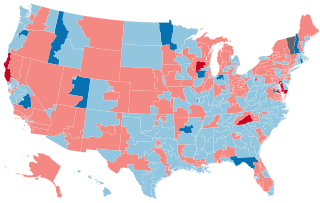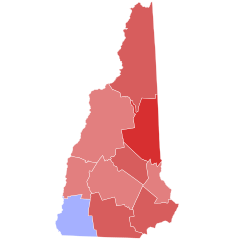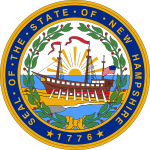
The 1990 United States House of Representatives elections was an election for the United States House of Representatives on November 6, 1990, to elect members to serve in the 102nd United States Congress. They occurred in the middle of President George H. W. Bush's term. As in most midterm elections, the President's Republican Party lost seats to the Democratic Party, slightly increasing the Democratic majority in the chamber. It was a rare instance, however, in which both major parties lost votes to third parties such as the Libertarian Party as well as independent candidates.

The 2006 New Hampshire gubernatorial election took place on November 7, 2006. Incumbent Democrat John Lynch defeated Republican James B. Coburn and won a second term as Governor of New Hampshire.

United States gubernatorial elections were held on November 3, 1998, in 36 states and two territories. Going into the election cycle, 24 of the seats were held by Republicans, 11 by Democrats, and one by an Independent. The elections changed the national balance of power by the loss of one Republican and the gain of one Independent, although political party dominance was shifted in nine states. Democrats gained open seats in California and Iowa and defeated incumbents Fob James of Alabama and David Beasley of South Carolina, while Republicans won open seats in Colorado, Florida, Nebraska, and Nevada and the Reform Party won an open Republican governorship in Minnesota. By the end of the election, 23 seats were held by Republicans, 11 by Democrats, one by the Reform Party, and one by an Independent.

The Libertarian Party of New Hampshire (LPNH) is the New Hampshire affiliate of the national Libertarian Party (LP). Active since its foundation in 1972, it is the third-largest political party in the state having had multiple members elected to the New Hampshire House of Representatives as well as being ballot-qualified multiple times.

The 2008 New Hampshire gubernatorial election, took place on November 4, 2008. Incumbent governor John Lynch won his third term with a landslide victory over Republican opponent Joseph Kenney.

The 1992 New Hampshire gubernatorial election took place on November 3, 1992. Republican nominee Steve Merrill, who defeated Ed Dupont and Liz Hager for the Republican nomination, won the election, defeating Deborah Arnie Arnesen, who had defeated Norman D'Amours for the Democratic nomination.

The 1800 New Hampshire gubernatorial election took place on March 11, 1800. Incumbent Federalist Governor John Taylor Gilman won re-election to a seventh term, defeating Democratic-Republican candidate Timothy Walker.

The 1801 New Hampshire gubernatorial election took place on March 10, 1801. Incumbent Federalist Governor John Taylor Gilman won re-election to an eighth term, defeating Democratic-Republican candidate Timothy Walker in a re-match of the previous year's election.

The 1799 New Hampshire gubernatorial election took place on March 12, 1799. Incumbent Federalist Governor John Taylor Gilman won re-election to a sixth term.

The 1797 New Hampshire gubernatorial election took place on March 14, 1797. Incumbent Federalist Governor John Taylor Gilman won re-election to a fourth term.

The 1798 New Hampshire gubernatorial election took place on March 13, 1798. Incumbent Federalist Governor John Taylor Gilman won re-election to a fifth term, easily defeating various minor candidates.

The 1802 New Hampshire gubernatorial election took place on March 9, 1802. Incumbent Federalist Governor John Taylor Gilman won re-election to a ninth term, defeating Democratic-Republican candidate, former Governor and U.S. Senator John Langdon.

The 1803 New Hampshire gubernatorial election took place on March 8, 1803. Incumbent Federalist Governor John Taylor Gilman won re-election to a tenth term, defeating Democratic-Republican candidate, former Governor and United States Senator John Langdon in a re-match of the previous year's election.

The 1804 New Hampshire gubernatorial election took place on March 13, 1804. Incumbent Federalist Governor John Taylor Gilman won re-election to an eleventh term, defeating Democratic-Republican candidate, former Governor and U.S. Senator John Langdon in a re-match of the previous year's election.

The 1820 New Hampshire gubernatorial election was held on March 14, 1820.

The 1821 New Hampshire gubernatorial election was held on March 13, 1821.

The 1822 New Hampshire gubernatorial election was held on March 12, 1822.

The 1828 New Hampshire gubernatorial election was held on March 11, 1828.

The 1827 New Hampshire gubernatorial election was held on March 13, 1827.












